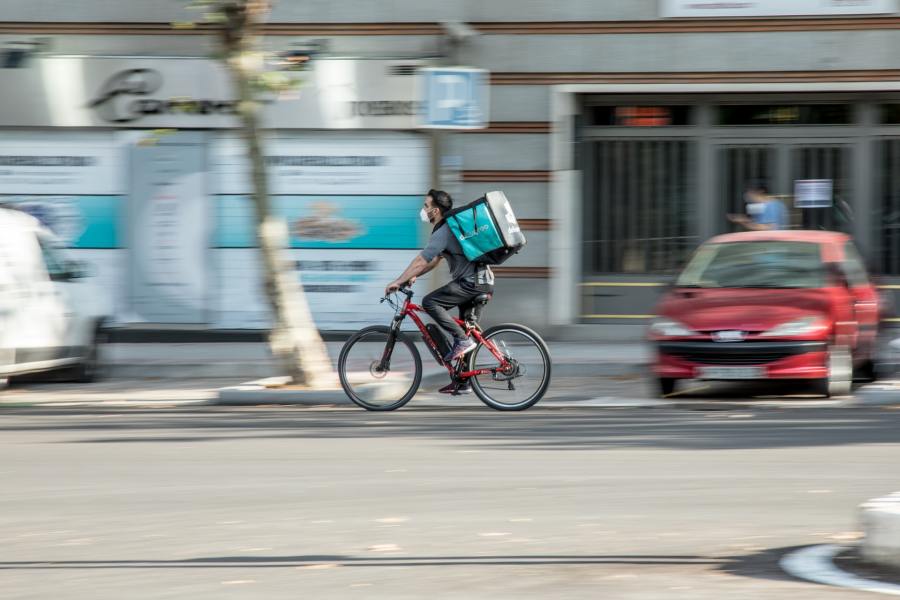Diego Franco v Deliveroo Australia Pty Ltd [2021] FWC 2818 (18 May 2021)
The Fair Work Commission recently heard a further unfair dismissal case brought by a worker in the gig economy.
In Franco v Deliveroo Australia Pty Ltd, Deliveroo driver Diego Franco was successful in claiming that he was an employee who had been unfairly dismissed when Deliveroo terminated his supply agreement. The Commission was also highly critical of Deliveroo's actions.
Background
Mr Franco entered into a supply agreement with Deliveroo in April 2017 and worked for the company until his agreement was terminated in April 2020.
In April 2020, Deliveroo undertook a review of rider accounts associated with customer complaints. Mr Franco was identified as having significantly delayed delivery times and the decision was made to terminate his supplier agreement. The email noted that, because Mr Franco was failing to deliver orders in a reasonable time, he had breached the supplier agreement and was being given seven days' notice of termination. Mr Franco unsuccessfully attempted to persuade the company to reconsider its decision, and on 30 April 2020, Mr Franco's access to the Deliveroo Rider App was disabled.
In his unfair dismissal application, Mr Franco sought orders for reinstatement, continuity of service and backpay.
Deliveroo raised the jurisdictional argument that Mr Franco could not bring an unfair dismissal claim because he was not an employee of Deliveroo. Deliveroo's argument was that Mr Franco was an independent contractor.
The decision
The Commission carefully considered the various factors and indicia pointing towards either an employment relationship or an independent contractor relationship.
Mr Franco worked for competitors Uber Eats and Door Dash at other times, however, Deliveroo was his primary work. The commissioner recognised this as a factor that worked against the existence of an employment relationship, but noted that in the context of a modern, rapidly changing workplace, it was not a factor that should be construed as precluding an employment relationship. The commissioner noted that workplace changes in response to COVID-19 and technologies meant that individuals could be engaged by multiple employers through, for example, multiple online customer service chatrooms, call centre activities and online telemarketing.
On the issue of control, Deliveroo asserted that it did not have any control over when or where Mr Franco worked. This would normally be indicative of an independent contractor relationship. However, the commissioner noted that Deliveroo possessed the capacity to exercise a significant level of control, including using data metrics to control workers. It was noted that for a period between February 2018 and January 2020, Deliveroo utilised a self-service booking system which required riders to book sessions in advance and involved a prioritisation system whereby performance factors were used to rank riders and allow those with the greatest "performance" to book in first. This prevented riders from logging on to the Deliveroo app whenever they felt like working. While this wasn't in place at the time Mr Franco ceased working for Deliveroo, the commissioner was mindful that Deliveroo had the ability to reintroduce such a system at will.
The written terms of the supplier agreement were acknowledged to be an important factor in the correct characterisation of the relationship. However, in light of Deliveroo determining the terms of the supplier agreement unilaterally and the lack of bargaining power of Mr Franco, the commissioner said that these terms needed to be treated with a degree of caution.
Delegation or sub-contracting is generally considered inconsistent with an employment relationship that requires personal service. Deliveroo permitted Mr Franco to delegate or sub-contract, subject to certain terms and conditions. The commissioner noted that arrangements involving shift or job swaps are commonly encountered in the context of an employment relationship, for example where a casual employee is unable or unwilling to work a predetermined engagement. The commissioner noted that the capacity to delegate work to another person, while being an indicator that points away from an employment relationship, does not preclude it.
Other factors that were considered included Mr Franco providing his own equipment, Deliveroo not requiring Mr Franco to dress in Deliveroo-branded attire, the method of payment to Mr Franco and the fact that Mr Franco claimed his expenses as business deductions. On the method of payment and business deductions, the commissioner said that these factors, while pointing towards an independent contractor relationship, were a logical reflection of the arrangements established under the supplier agreement.
On balance, the commissioner determined that the correct characterisation of the relationship between Mr Franco and Deliveroo was that of employee and employer.
Dismissal
Following the finding that Mr Franco was in fact an employee, the commissioner turned to the dismissal itself.
The commissioner noted that Mr Franco was not provided with any clear indication of the delivery times that were expected of him. For failure to deliver in a reasonable time to be a valid reason for dismissal, there would need to be evidence that the expectations were communicated to him and that he was aware that if these expectations were not achieved, it could lead to dismissal. The absence of this evidence meant that the failure to deliver orders in a reasonable time could not represent a well-founded reason. There was therefore no valid reason for the dismissal of Mr Franco.
The commissioner was also highly critical of the manner in which the termination of services was notified (via email) and noted that, regardless of whether it is an employment relationship, or independent contractor relationship, termination is of "such significance that basic human dignity requires that a matter of such gravity should be conveyed personally". Further, the commissioner noted that:
"The access that digital platform businesses have to extensive quantities of data and which provide the capacity for detailed examination of performance metrics, should not translate into a license to treat individuals, whether they be employees or contractors, without a level of fundamental, human compassion."
It was not in dispute that Deliveroo did not provide Mr Franco with an opportunity to respond to the identified slowness of his delivery times, prior to the termination of his supplier agreement, nor provide him with a warning of unsatisfactory performance.
The termination of Mr Franco's supplier agreement was found to be unjust, unreasonable and unnecessarily harsh.
Reinstatement
It was noted that there may have been some tension between Mr Franco and Deliveroo due to Mr Franco publicly criticising Deliveroo's alleged treatment of drivers. However, the Commission considered that reinstatement was appropriate, owing to the lack of Deliveroo management or supervision on a day-to-day basis, with most communications made through an online chat forum. This was said to remove many of the potential practical difficulties associated with restoring the employment relationship.
Continuity of service and restoration of lost pay were also ordered.
Deliveroo has indicated that it will appeal the decision.
Implications
Interestingly, this decision contrasts with the recent full bench decision of Gupta v Portier Pacific Pty Ltd; Uber Australia Pty Ltd t/a Uber Eats [2020] FWCFB 1698 where it was determined that Uber Eats drivers were not employees. Both Deliveroo and Uber Eats operate similar business models, and the differing determinations are likely to be concerning and confusing for similar gig economy platforms. These decisions, in conjunction with recent calls for greater regulation over the gig economy, are likely to lead to statutory changes at the state and federal level in the near future.
All information on this site is of a general nature only and is not intended to be relied upon as, nor to be a substitute for, specific legal professional advice. No responsibility for the loss occasioned to any person acting on or refraining from action as a result of any material published can be accepted.
 Client portal
Client portal










